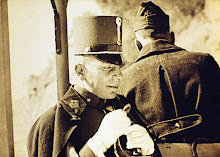
orandum est ut sit mens sana in corpore sano.
fortem posce animum mortis terrore carentem,
qui spatium uitae extremum inter munera ponat
naturae, qui ferre queat quoscumque labores,
nesciat irasci, cupiat nihil et potiores
Herculis aerumnas credat saeuosque labores
et uenere et cenis et pluma Sardanapalli.
monstro quod ipse tibi possis dare; semita certe
tranquillae per uirtutem patet unica uitae.
(10.356-64)
It is to be prayed that the mind be sound in a sound body.
Ask for a brave soul that lacks the fear of death,
which places the length of life last among nature’s blessings,
which is able to bear whatever kind of sufferings,
does not know anger, lusts for nothing and believes
the hardships and savage labors of Hercules better than
the satisfactions, feasts, and feather bed of an Eastern king.
I will reveal what you are able to give yourself;
For certain, the one footpath of a tranquil life lies through virtue.
("Satire X"; Juvenal)













